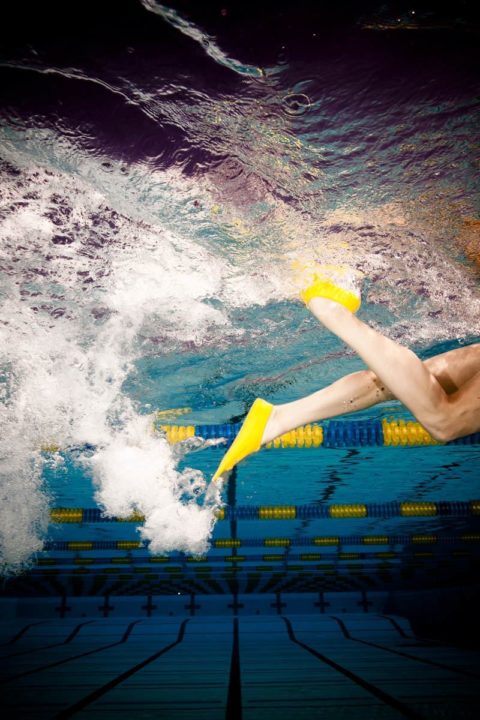Elite swimmers spend the majority of their time training in complete physical disrepair. That is, swimmers generally over train their bodies in hopes of a bigger payout when it comes time to taper and shave. However, the use of short blade fins, such as FINIS Zoomers, gives swimmers the capability to be fast at any given point in the season. So how do these fins help an athlete train smarter in the middle of their cycle? In reality, there are a number of answers to that question.
First, we briefly touched on the idea of going fast. Proper use of the Zoomers gives swimmers a way to instantly increase the intensity of the workout. Zoomers are designed to mimic a barefoot better than standard fins, meaning that in order to experience full velocity you have to exert a lot more energy. There is far less water caught on the surface of a Zoomer so swimmers should anticipate kicking more frequently and harder than in long blade fins. This trains the body to use strong and fluid movements to complete the kick cycle. In this manner, the technical aspect of this product can be applied better to swimming without fins with short, fast kicks and therefore, better at simulating a racing scenario.
Bursts of explosive kicking off of each wall can add a unique element to many different types of training. Sets of 25s or 15-meter sprints are extremely beneficial for practicing breakouts and fast-twitch (anaerobic) processes. Zoomers are designed to catch more water than a swimmer typically can grab at a rate that is still difficult to maintain. This serves as a method of resistance training which strengthens the targeted areas as you swim. Not only do the legs receive a workout, but the long muscles extending through the abdominal region and lower back are stimulated in order to keep the core rigid and streamlined. In addition to being a great tool for swimming below the surface, Zoomers also have the ability to manufacture a flatter freestyle stroke, which is more desirable among sprinters. The additional force given from the kick helps to limit rotation and allow for a deeper catch that sprinters require.
Sets for sprinters:
4 Rounds:
1×25 Breakout (4-6 fast strokes, then easy), on :30
1×25 Over-kick Freestyle, Build (70% increasing to 100%), on :30
1×25 Easy, on :40
1×25 FAST -or- Underwater Kick— Fast, on :30
Then:
8×75 Descend laps 1-3, on 1:15
- 4, 5, 6 kicks off each wall
= 1,000 yards total

FINIS Zoomers are also a great tool to add intensity to a longer aerobic workout or for a swimmer who is fairly fatigued. During a high-volume workout, a swimmer can still experience a heart rate spike if a segment of over-kick freestyle or an underwater kick out is implemented. The aerobic threshold can easily be matched at almost any distance this way. In the same manner, a swimmer attempting to rest and recover can use Zoomers to better negotiate the amount of effort they put into a set. During the swim they can change intensities as needed, allowing them to piece together a swim that is appropriate to their level of fatigue.
Sets for distance swimmers:
3 Rounds:
3×100 Descending 1-3, on 1:15
1×400 Underwater to 15m/6-8 Kicks off each wall, on 6:00
=2,100 yards total
All successful swimmers have fins, like the FINIS Zoomers, as a staple in their equipment bag. When used consistently they make you a stronger, faster athlete.
For more information on swimming technique and news make sure to check out the FINIS Blog and follow FINIS on Twitter & Facebook

Its best to participate in a contest for probably the greatest blogs on the web. I will advocate this website!